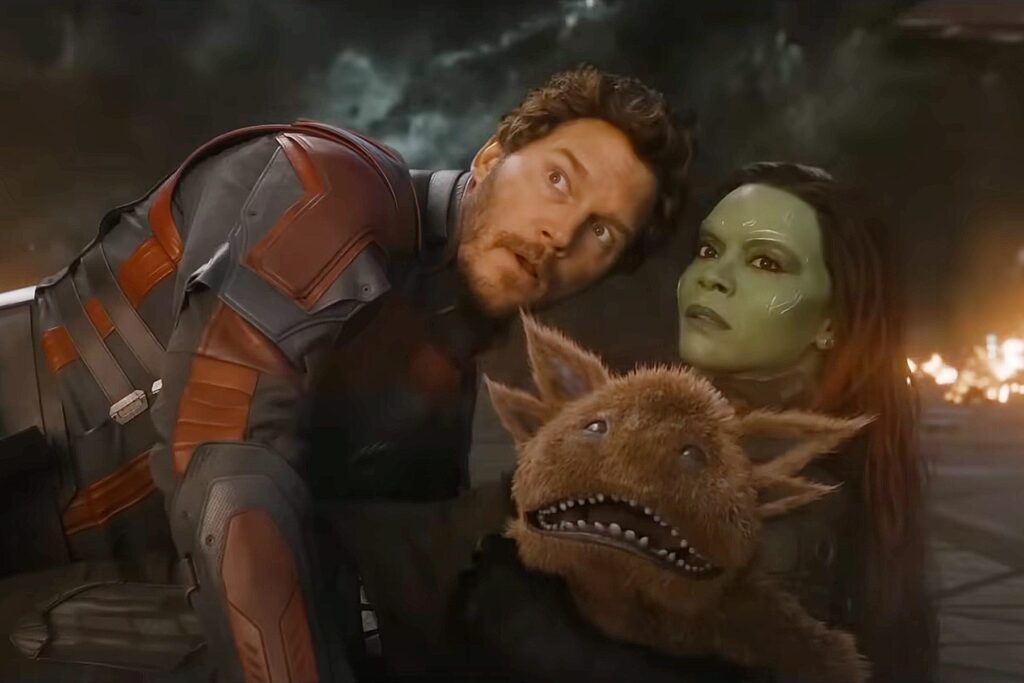
James Gunn is best known for his eclectic needle drops, but he also has a visual signature: the Right Stuff-style shot of a troop of swaggering warriors striding forward in slow motion as a pop song blares on the soundtrack. He delivers that image twice in Guardians of the Galaxy, Vol. 3, and while the second is more conventionally satisfying—the final prelude to some long-awaited interstellar ass-kicking—the first is more memorable. It’s noteworthy in part because the characters aren’t walking but floating, having just leapt from a spacecraft onto a bulbous planet (kindly shelve your astrophysical fact-checks), but what’s really striking is that each hero is outfitted in a bulky suit of a different bright color. There’s a simple beauty to the image, an eye-catching quality that’s rare for the Marvel Cinematic Universe—a cultural behemoth which, for all its commercial savvy and box-office supremacy, isn’t exactly a pioneer in terms of visual innovation. In this context, it’s oddly gratifying to be watching a superhero movie that actually cares what it looks like.
Let’s not pretend that Guardians 3 is some sort of aesthetic revelation. It’s still an MCU flick, which means it traffics heavily in green-screened locations, weightless special effects, and haphazard streams of light and fire. When an unknown gold-skinned invader (Will Poulter) zooms through the atmosphere and crashes into the chest of Rocket—the computer-generated mutant raccoon voiced by Bradley Cooper, and again embodied on set by the director’s brother, Sean Gunn—the impact is as forceful as that of a coder clacking away at their keyboard. But the value of James Gunn—the canny maneuver that helps distinguish the Guardians pictures from their costumed brethren—is his knack for minimizing the genre’s inherent drawbacks (sloppy action, dull world-building) while emphasizing his own vibrant strengths (sharp dialogue, giddy imagination). Sure, Volume 3 is yet another chaotic adventure involving a desperate rescue mission, a precious MacGuffin, and a megalomaniacal villain. But mostly, it’s a family vacation comedy.
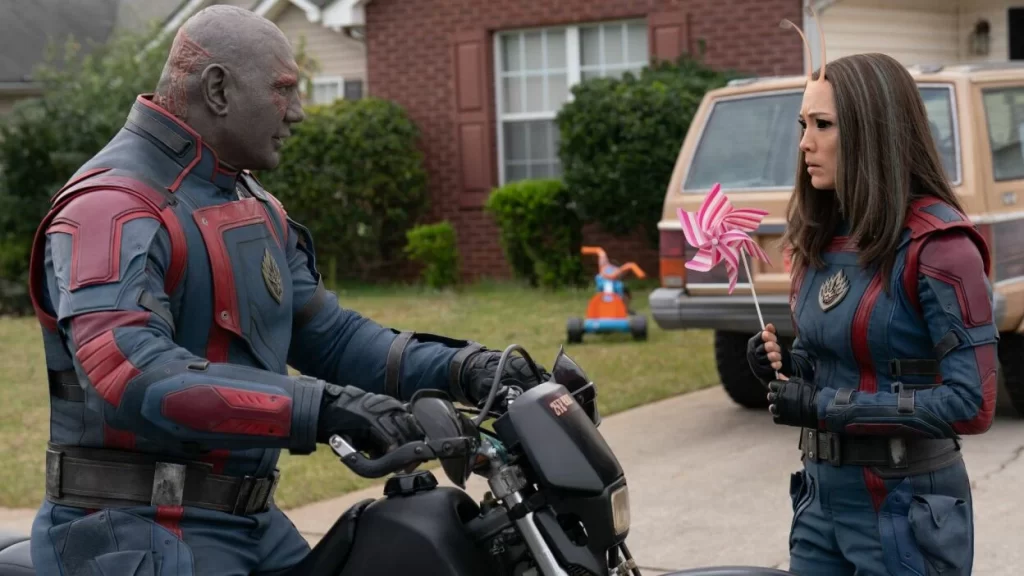
True, aside from a pair of half-siblings, there aren’t any strict genealogical ties among the Guardians. But after three primary features (plus bonus appearances in the Avengers films and Thor: Love and Thunder), they’ve developed the relaxed familiarity and tight-knit bonds akin to, well, kin. “She only calls me Star-Lord when she’s mad at me,” pouts Peter Quill (Chris Pratt), in the gloomy tone of a husband whose wife has repeatedly chastised him for failing to take out the garbage. He’s referring to the mechanical-armed Nebula (Karen Gillan), and while their relationship is strictly platonic—the suggestion otherwise prompts mutual derision which morphs into amusing introspection—they nonetheless behave like weary parents who are constantly supervising an unruly brood. Certainly Drax the Destroyer (Dave Bautista), with his noisy outbursts and perpetual inability to perceive sarcasm, has the temperament of an overeager child, and while the Baby Groot from Volume 2 has now matured into a more imposing arboreal creature (voiced by Vin Diesel, motion-captured by Austin Freeman), his vocabulary still totals three words. The empathic alien Mantis (Pom Klementieff) is a bit like the adopted cousin who moved in once her parents died, while the mercenary Kraglin (Sean Gunn, in visible form this time) is the friendly neighbor whom they trust to water the plants while they’re away. They even have a pet dog: a Russian canine named Cosmo who can somehow articulate human thoughts, which are conveyed in the lightly accented voice of Maria Bakalova.
And then there is Rocket, whose outwardly grouchy demeanor camouflages an avuncular spirit that personifies the Guardians’ abiding camaraderie, and whose early injury inspires their newest (and theoretically last) quest. That aforementioned collision sends Rocket into a perilous coma, and following some plotty verbiage (kill switch, override code, blah blah), we learn that his recovery hinges on the acquisition of a crucial program. (Remember what I said about MacGuffins?) And so, the rest of this makeshift household jets out on a new mission, one whose putative purpose is to obtain life-saving data but whose true cinematic value lies in affording its members further opportunity to bond, bicker, and laugh.
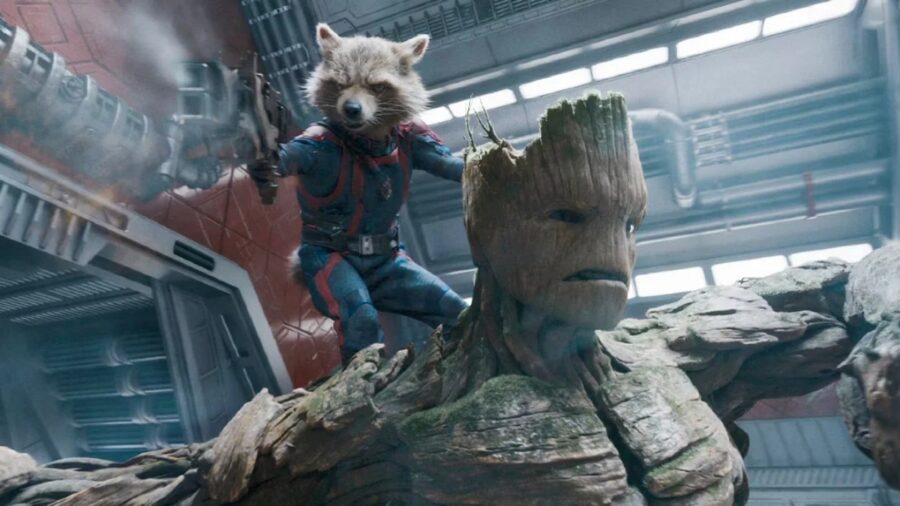
Rocket’s medically induced absence from this escapade initially seems like a narrative miscalculation, in light of Cooper’s rascally charm and the character’s overall centrality to the enterprise. (Most plot developments in the MCU tend to vanish from my hippocampus, but I will always remember the scene from the first Guardians where Rocket demands that his cohorts steal an inmate’s prosthetic leg, even though it carries no use in his escape plan.) But Gunn has devised a nifty parallel story featuring our favorite smirking raccoon, periodically flashing back to his youth in a dystopian facility. These sequences nominally bolster the plot—they introduce us to the film’s chief villain, a sneering mad scientist called the High Evolutionary (Chukwudi Iwuji, from Gunn’s Peacemaker series)—but they also produce some pathos in showing us Rocket’s first circumstantial family. Caged and referred to only by an alphanumeric slogan (his “89P13” is an offshoot of Jean Valjean’s “24601”), Rocket befriends three fellow artificially enhanced animals—a tender otter (Linda Cardellini), a playful rabbit (Mikaela Hoover), and a noble walrus (Asim Chaudhry)—who are also subjected to the High Evolutionary’s dastardly experiments. The brief scenes of these adorable computer-generated beasts forming links of solidarity are strangely touching, reminding us that digital wizardry is most effective when it’s applied in combination with real human emotion.
There’s plenty of that in the present-day scenes as well, though it carries a different flavor from the vague platitudes of love and brotherhood that typify the MCU. The relationship between Drax and Mantis is intriguingly asymmetrical; the sequence in which she alters his memory—thereby erasing a tirade in which she calls him kindhearted but stupid—complicates their goofy friendship. But the pairing that forms the movie’s key dramatic axis is that between Peter and Gamora (Zoe Saldaña), the green-skinned daughter of Thanos who was killed during Avengers: Infinity War, only to be, er, resurrected from a different multiverse in Endgame. That is a lot of expositional mumbo-jumbo—a necessary obstacle which Gunn’s screenplay bulldozes over with admirable efficiency—but the rub is that Peter’s ex-girlfriend is still dead, and the angry doppelganger who now stands in her place has no knowledge of their prior romance.
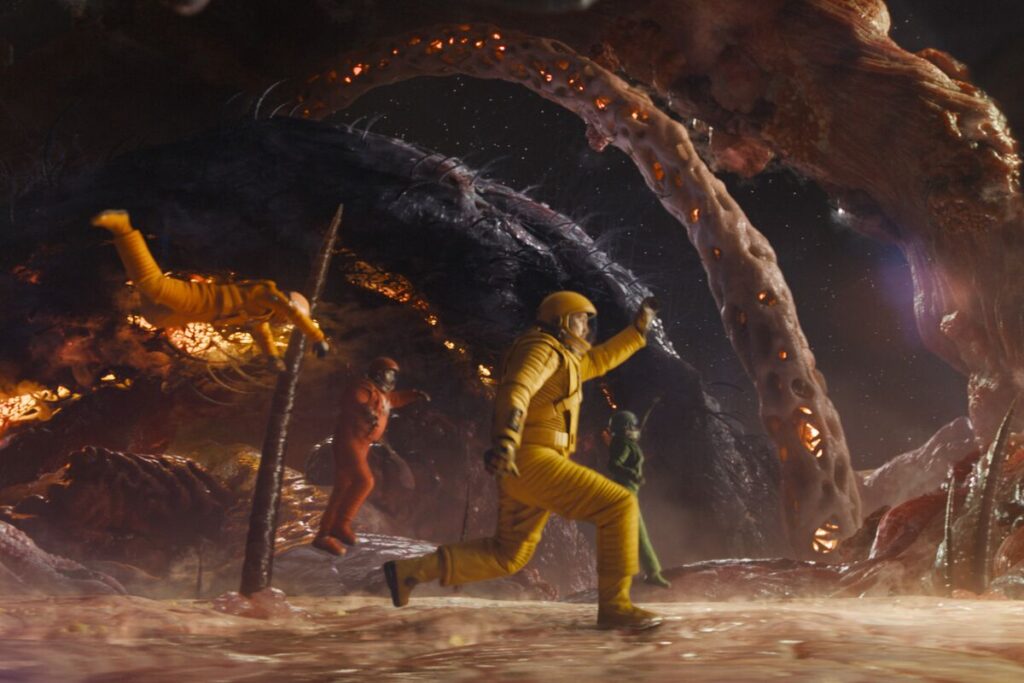
A more facile version of Volume 3 might have explored the possibility of retrieving Gamora’s lost recollections, and of reigniting what passes for passion in the largely sterile MCU. But Gunn declines this invitation for easy sentimentality, instead opting to reaffirm the character’s essential coldness and lethality (traits Saldaña is no stranger to amplifying). That the chilly Gamora gradually warms to Peter is inevitable, but her slow thaw is in keeping with the movie’s amiability and fraternity; the runner in which she expresses disbelief that everyone else can interpret Groot’s repetitive statements is funny, but it also yields a legitimately sweet payoff.
Humor, however, remains the franchise’s (ahem) rocket fuel. Despite his attempted makeover into a heartthrob, Pratt isn’t the most persuasive sulker, but he remains a spry ensemble comedian, and he evinces strong chemistry with the rest of the cast, especially Gillan. The so-called shippers of Peter and Nebula miss the point; the characters are already together, only their partnership is comical rather than sexual, and Pratt and Gillan make syncopated music from their oil-and-water antagonism. (The scene in which Peter instructs Nebula to “open the fucking door” has spawned regrettable online discourse over Marvel’s newfound indulgence of profanity; it also happens to generate an enormous laugh.)
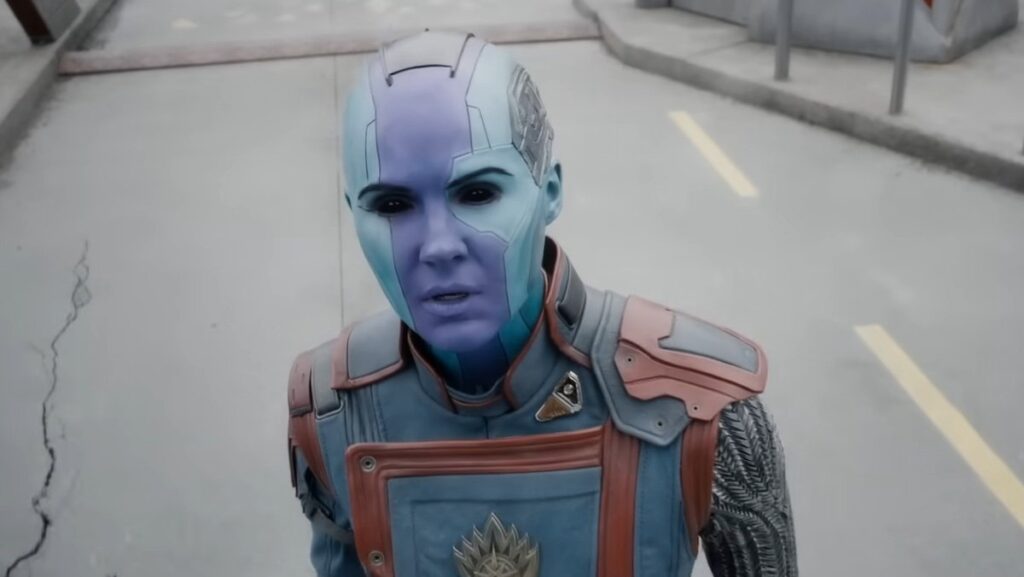
That Gunn has turned a superhero blockbuster into a playful gabfest hasn’t shielded him from the obligation to deliver loud, hulking set pieces. His work in this regard is uneven, perhaps due to lack of interest; an early brawl on a space station (hi Nathan Fillion!) is most notable for Mantis warping the minds of her foes and assigning each of them a particular obsession (cats, dancing, etc.), a joke which isn’t all that funny but is at least more entertaining than the typical exchange of laser beams. It doesn’t help that Gunn’s big bad is mostly blah, as the High Evolutionary is another of those tedious lunatics intent on perfecting a utopian society, though his preening superiority is almost worth it for the hilarious moment when he steps atop a crate in order to loom over the much taller Elizabeth Debicki. Still, while the climax, whose bizarre child-rescue angle feels lifted from Indiana Jones and the Temple of Doom, is generally a bore—supplying the standard CGI mélange of heroic leaping, intangible blasting, and telekinetic straining—Gunn shows some action chops when he applies himself, as in a single-take rampage where the Guardians mete out justice while accompanied by the thrashing rock of Beastie Boys.
And there is enough personality in Guardians of the Galaxy, Vol. 3—whether it’s illuminating the exotic colors of a faraway cluster of gorgeously swirling stars, or turning a private heart-to-heart into a stage for some cringeworthy eavesdropping, or setting a healthy chunk of its final act in an alt-universe suburbia—that it transcends its corporate imperatives. I won’t pretend that this movie represents the end of the MCU, but it does feel like the final bow for most of these characters, and that means something. And while I wouldn’t dare spoil the closing needle drop—a magnificent selection that finally propels the classic-hits soundtrack into the 21st century—allow me to paraphrase its lyrics: The Guardians’ days are over. And in shepherding their end, James Gunn has left all his love and longing for them up there on screen.
Grade: B
Jeremy Beck is the editor-in-chief of MovieManifesto. He watches more movies and television than he probably should.
